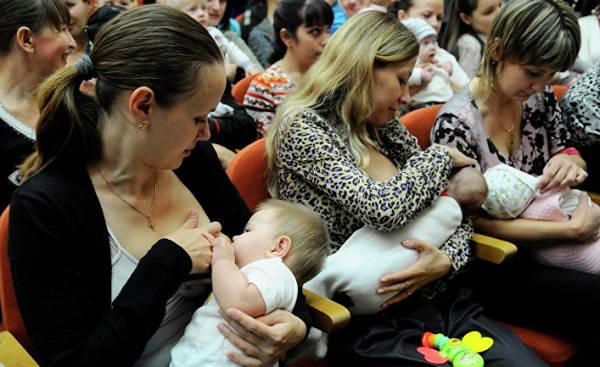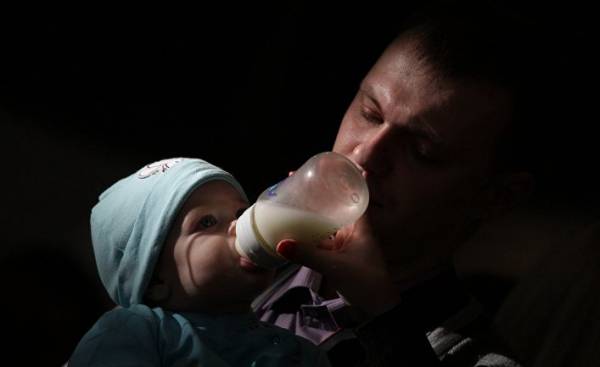
Breast-feeding undoubtedly has many advantages. However, the pressure that is sometimes exerted on women through various campaigns in support of breastfeeding, including state-sponsored, bears in itself potential danger. Columnist for BBC Future explains why mothers should have the right of free choice.
When Suzanne Barston from Chicago was expecting the birth of her first child, she was determined to do everything right — in particular, to feed her son breast.
“I even took courses of preparation for breastfeeding,” says the woman.
But after a few days it became clear that the child cannot properly suckle, and Suzanne had to Express milk and feed baby from a bottle.
This daily procedure took several hours, almost never leaving the woman time for myself. Mental and physical exhaustion led to postpartum depression.
The son of Suzanne, too, didn’t feel good, he had a skin rash and bloody diarrhea.
The doctor said that this may be caused by an allergic reaction to some food in mother’s diet and offered to try hypoallergenic formula.
In just two days the digestion of the baby improved, and all unpleasant symptoms disappeared.
Good that it ended that way, but remembering their suffering, Barston outraged. Why so hard on mothers? In her opinion, “the role of breastfeeding are greatly exaggerated.”
Exaggerated? Sounds pretty strange. “Breastfeeding for baby — best option,” suggest one voice who, UNICEF and many other respected medical organizations.
They note that in the first six months of life, children should get only breast milk, as this is a huge plus for the health of mothers and their newborns.
Breast milk is considered so valuable, that women are recommended to breastfeed until the child turns one, or even two years.
Recently, however, thesis “breastfeeding at any cost” is being increasingly questioned.
Social activists, doctors and scientists say that if the process of breastfeeding is not given to the woman easily, it could have negative consequences.
Besides, some women cannot physically produce enough milk.
If time does not pay attention to the condition of the child, it can lead to dehydration of the body, sometimes even with the risk of brain damage.
The main question — not “breast or formula”, and does the child good nutrition, according to the defenders of freedom of choice.
“We talk a lot about the benefits of breastfeeding is wonderful, but tell us also about the risks and let women make their choice,” says Amy tater, former midwife and author of Push Back (“fight”), in which she harshly criticized the movement for a natural approach to motherhood.
What do the facts show? What are the results of research?
The official attitude to breastfeeding today is very different from what it was in the past. When in the first half of the twentieth century, formula milk gained popularity, manufacturers advertised their products, claiming that the mixture is better than breast milk.
Health workers advise women to breastfeed, considering it old-fashioned or a lot of the lower class.
Now it seems at least strange, since we know that breast milk contains a huge amount of nutrients, in particular, antibodies to many bacteria.
In addition, the composition of milk varies from day to day to meet the needs of the child in various minerals. Even within a single feeding at first, the baby receives a more watery milk that quenches thirst.
There is another problem, emphasizing the advantage of breast-feeding. The mixture usually comes in the form of powder which must be diluted with water, and in poor countries sometimes lack access to clean drinking water or no possibility to boil it.
Thus, due to the living conditions of women cannot use the product properly. They have to use water of questionable purity or pour the mixture into unsterilized bottles.
By the early 1970s the public around the world began to have my suspicions that manufacturers of dry mixtures for feeding infants, vigorously promoting their goods in third world countries and convincing mothers that formula feeding was preferable to the natural, deliberately distort the facts.
Activists fight against dry mixes argued that artificial baby food contributes to the suffering of children, and even sudden death, especially in families of the poor.
In the end, this led to a boycott of the products of one of the largest baby food manufacturers — Nestle.
Today, in many countries (including in Britain — Ed.) advertising of breast-milk substitutes, and the medical staff strongly recommends that parents of breastfeeding.
At some point, Barston felt condemning her for what she fed the baby. And then she started a blog called “Feeding mixture without fear and without reproach” (Fearless Formula Feeder) to support other women who find themselves in a similar situation.
In the comments to the blog women told me how she suffered from postpartum depression because of the pressure, which they were.
Of course, many get pleasure from breastfeeding. However, there are women for whom this process turns into real agony. And this only exacerbates the already existing difficulties of young parents — such as lack of time and lack of sleep.
Theoretically the husband can help the wife feed the baby expressed breast milk from a bottle, but, first, not all women can Express milk, and secondly, some babies absolutely refuse bottles. And then the burden of feeding falls entirely on the mother.
“Physical exhaustion is bad for mental health, says Barton. — I have heard many horror stories. Some women were just on the verge of suicide”.
And there are women who just physically are not able to fully feed the baby her milk.
Women usually say that this rarely happens. For example, on the website of the National health service of great Britain noted that “almost all women can produce milk.”
However, as shows the study conducted by Marianne Neifert from St. Luke’s in Denver, in reality, every seventh women enough milk to fully feed the baby.
only produced in a few days after birth. And in these early days the baby can develop dehydration or jaundice — as a side effect of lack of milk.
A pediatrician from the clinic in London Barts Health Sasha Howard watched a lot of cases of dehydration in children who were exclusively breastfed.
“They had to Supplement with formula from a bottle or nasogastric tube. And some even put a dropper,” she notes.
In some, albeit rare, cases, dehydration can lead to brain damage and death.
 © RIA Novosti, Eugene biyatov | go to fotobounce on the BabyFest festival in Sokolniki
© RIA Novosti, Eugene biyatov | go to fotobounce on the BabyFest festival in Sokolniki
Ten years ago, if in the process of breastfeeding problems, the medical staff suggested the use of the mixture.
However, now in hospitals of many countries follow the instructions of UNICEF and actively encourage breastfeeding. In the post-Natal departments of hospitals, such dairy mixes are stored in cabinets under lock and key — just as, for example, morphine, prescription only doctor.
“Of course, no one pursues mothers and make them feel guilty,” says trish McEnroe, Executive Director of Baby-Friendly USA.
She noted that before the doctors, regardless of the wishes of the mother immediately after birth took the baby from her and gave him a bottle. The goal of the program is to end the practice that prevented the natural process of feeding a newborn.
If the child begin to feed artificially, it is less likely to suck the breast, and women have reduced the amount of milk, and the child is deprived of many useful substances, says McEnroe. But numerous studies have proven that breastfeeding protects the infant against infectious zabalawi and allergies, and also improves the intelligence quotient.
However, this argument has weaknesses. First, it is not proved that the child supplementary feeding with a mixture hinder breastfeeding. Milk will not disappear, if one or two times a day to give a mixture.
Many women successfully combine breast and bottle feeding for many months. “For some it is the best option,” says McEnroe.
Second, it is unclear whether the benefits of breastfeeding are so significant. There are doubts about the reliability of the results obtained in the study of this problem.
Because breastfeeding is a very personal matter, scientists can not divide subjects into groups and get them to feed their kids only some certain way.
So the only way is to observe the feeding process and subsequently evaluate the results.
Such studies do indicate the existence of a relationship between breastfeeding and good health, but it is not yet proven.
Of course, we can claim that the sneakers improve physical fitness. Yeah, a few connections there, but there is also the main factor is regular exercise.
As for breastfeeding, it is such an important factor may be the level of income and education. Today breastfeeding is more common in families with high income — and because they adhere more to recommendations of doctors, and because moms can afford to go on extended maternity leave.
In addition, the wealthy people more healthy for a number of reasons that have nothing to do with breastfeeding: they are, for example, smoke less and drink less alcohol.
It is therefore not surprising that babies who are breastfed grow up to be healthier. It’s just a symptom of the middle class.
Thus, in one American study, researchers observed the families in which one child was breast-fed, and his brother or sister — milk mixture.
The researchers could not prove that breast feeding gave the child a significant advantage over “iskusstvennym”.
However, in certain situations, the benefits are still there. Breast milk promotes healthy microflora in the gut of a premature baby and reduces the risk of developing severe infections such as sepsis.
Breastfeeding reduces the risk of infections in the first year of life in developed countries. These data are confirmed by objective studies.
Children breastfed less likely to suffer respiratory viral infections and suffer from diarrhea.
However, this effect disappears immediately after cessation of breastfeeding, and thus long-term health benefits, which are actively argue proponents of breastfeeding, hardly exist.
“If you ask the teachers of any kindergarten is to guess who of the children in the group were breastfed, and who is artificial, they will not be able to answer”, — stressed Barston.
Someone will say that once we know about certain benefits of breast milk, there is nothing wrong with them a little bit exaggerated — for the sake of advertising of breastfeeding.
However, such an approach casts doubt on the ability of each woman to independently make the right decision for themselves. Medicine should not be paternalistic, and even more coercive.
Nobody has the right to misinform people, when they take such a difficult and personal decision. Only the woman herself can weigh all “for” and “against”, conscious of how this choice will affect her mental and physical health or financial position of her family (if it is after the birth of a child in a hurry to go to work).
In the end, if a woman works full-time, even from home, feed the baby exclusively from the breast is very difficult.
The innumerable brochures and posters rests on the fact that breastfeeding is free, but this is so only if the mother can afford to take leave to care for a child.
In the US, for example, women who take leave on average at 10 weeks, and almost a third goes to work almost immediately after childbirth.
The current promotion of breastfeeding, of course, has its advantages. There are more opportunities to help women who have problems with lactation. In society, many say that no one should condemn a woman for breastfeeding in public.
However, activists such as Suzanne Barston — want women were free in their choice and that their choice won’t be judged.







